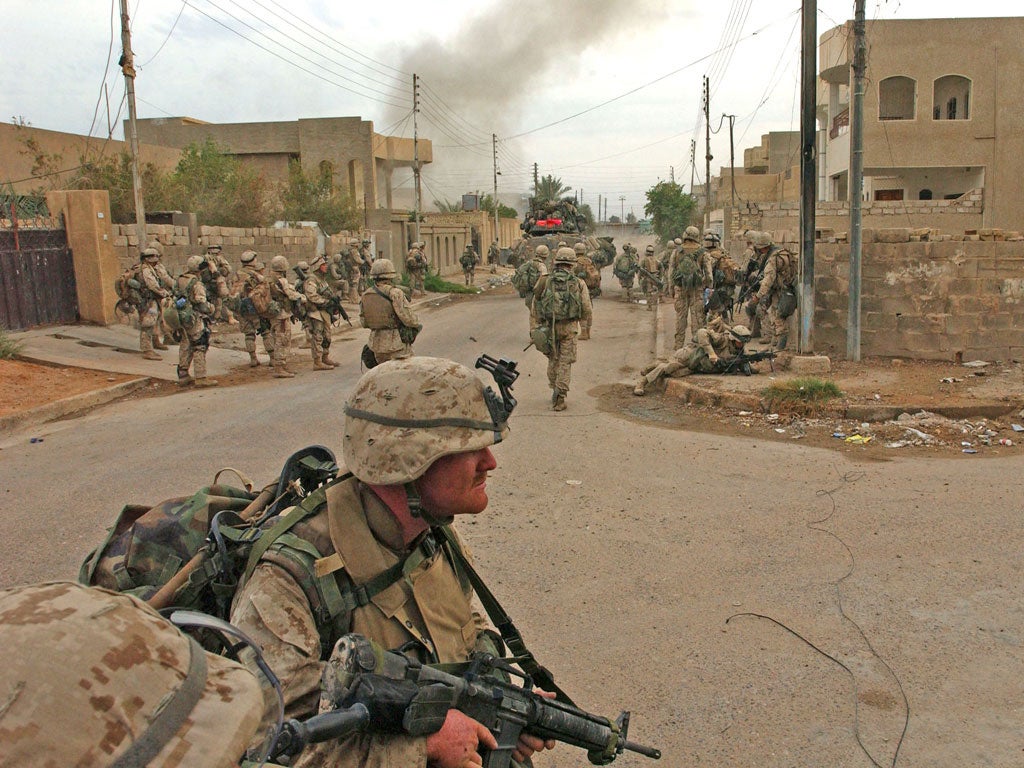There's a feeling of 'an empire departed' in Baghdad these days

"Al-Qa'ida killed two of our men here two days ago," the cop said. "Then they called us up to tell us the name of their operation – on a police radio!"
We were standing in rebuilt Fallujah, where the police request all foreigners to call for an escort. We got six, one wearing a ski mask. You get the idea. As a police colonel said later: "Al-Qa'ida [is] still here, they are a nuisance, to me personally when I have to move around the city. But they are not what they were." We were standing in the old US Marine base not far from the newly rebuilt railway station – there are, of course, no trains – and the pale stencil of "USMC" was still on the wall. But there was dust blowing around the yard and some of the sandbags had broken open.
All the way back to Baghdad, the old American bases looked scruffy, some of the concrete blast walls had collapsed. There was a feeling of an empire departed – Britain after the Romans had left. Not that Iraq doesn't have problems. Its Vice-President, Tariq al-Hashemi, has fled Baghdad for Iraqi Kurdistan, then flown to Qatar and Saudi Arabia and is touring the Gulf – to the rage of Prime Minister Nouri al-Maliki's government, which has charged him with running death squads. Mr Hashemi says three of his men have been tortured to death in a Baghdad prison – the Maliki administration says only one has died, of medical reasons.
It's not a good story. The central government even wants to discipline the authorities at the airport at Irbil, the Kurdish capital, for allowing Mr Hashemi to fly to Qatar. "Iraqi law is one and it applies to all, including Kurdistan," a government spokesman announced.
But it doesn't. Iraqi Kurdistan is almost a separate state – it has its own flag, its own language – though at least its car registration plates are still Iraqi. All the way up the highway to Irbil there are Iraqi police and army checkpoints – some of the police drive around in bright green-and-yellow Chevrolets – and they are a lot friendlier than the old American checkpoints where nervous, frightened US soldiers pointed their rifles at you in case you were a suicider.
There's a 40-mile stretch that is regarded as unsafe – it's al-Qa'ida territory – and then you're in Kurdistan and the rivers froth beneath the road and the cops are even friendlier. Yes, Iraq is safer, even though the old Sunni "resistance" – without any more American enemies to attack – has now announced its enemy is Iran. Well, maybe.
I was on the highway with Dr Lubna Naji, a 25 year-old medical practitioner. She shook her head and said: "There is no real country anymore. I talk to my friends, mostly doctors – and all talk of moving out of Iraq. They all dream of going outside. Because home is where you belong – where you are wanted. We've lost our sense of something that belongs to us, our homeland. We've lost our national identity as Iraqis."
You hear this a lot. The government, they tell you in Baghdad, is unashamedly sectarian. And corrupt. We drove past so many checkpoints, by the time I'm in Irbil I've counted 13 types of camouflage uniform. Those in black around Baghdad are el-Maliki's Shia el-Dawa party. The cops are militiamen, I'm told, in the town of el-Hawaya. Well, let them all obey the law. Monthly wages are £300 for police, for army officers £500. In Iraq, that's worth risking your life for.
Subscribe to Independent Premium to bookmark this article
Want to bookmark your favourite articles and stories to read or reference later? Start your Independent Premium subscription today.

Join our commenting forum
Join thought-provoking conversations, follow other Independent readers and see their replies